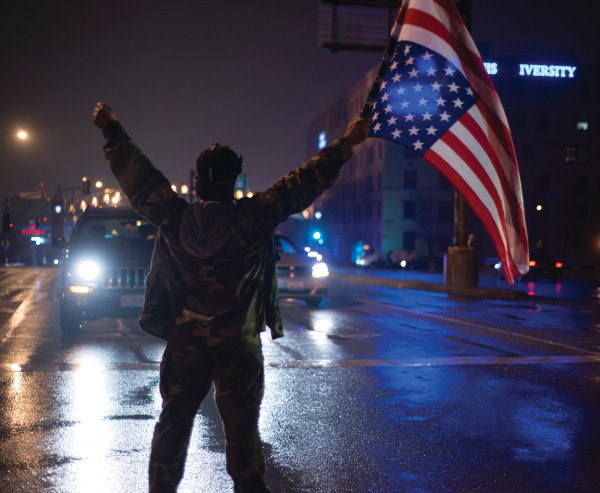
PHOTO/ADRIAN GARCIA
ST. LOUIS, MO — “Either We Organize, or We Die!” declared one protestor the night they announced no charges against Mike Brown’s killer, the cop Darren Wilson. I went to St. Louis/Ferguson after Mike Brown’s murder to await the Grand Jury decision and to interview African-American residents there, some of whom were old friends and colleagues. What sparked this mass, militant response against police brutality?
The delayed announcement sparked a wildfire around the world. As demonstrators hit the streets, I contacted a politically conscious, African-American artist/professor at Washington University who had just completed making an award winning film, “From Jim Crow to Obama”.
I asked how St. Louis—Ferguson especially—had come together so quickly. “St. Louis was ready!” she exclaimed proudly. “Law students had been monitoring police brutality in the city, and neighborhoods, church groups, women’s organizations had all been meeting regularly, because it had to stop! Ferguson is not the worst you know.”
She went on to praise the work of groups like CAPIC (Coalition to Abolish Prison Incarceration) and MORE (Missourians Organized to Reform and Empower), and “Sisters Talking Back”. “St. Louis was already on the move” she reiterated.
“MORE organized the Saturday march after Brown’s murder and that stunning St. Louis Symphony action. Groups all over the city, of all ethnicities and classes have been meeting. Vets for Peace, the Organization of Black Lawyers, and other community groups began organizing de-escalation training, scheduling rallies, leading Walmart shutdowns. Students rallied. Coalition meetings were called and that following Wednesday, people crowded into the city council meeting and made their demands. The council refused to respond, so groups met all over the city, then collectively decided on that huge march which brought people from the world. There was nothing spontaneous about it! We all pulled together. During one meeting a cop kept referring to the ‘riots’. ‘Stop calling them riots!’ several in the audience called out. The cops instigate the violence!’ This meeting gave the voiceless an opportunity to testify to police insults and abuses, and gave others the opportunity to listen and understand. In Ferguson, David Whitt organized a neighborhood watch and fund raisers to buy video cameras and sent people house to house to distribute them and show folks how to use them.”
When the Grand Jury announcement finally came, anger mounted as grief dissolved into a dignified rage, not only in Ferguson, but on Grand Avenue in the historically white south side: a major freeway was blocked, candles lit, chants intensified; many wept. I asked one young man if he was afraid as the cops came piling out of hiding from behind buildings and dark alleyways. “No”, he said boldly. “If they can kill you, and leave you to die like a dog in the street, you either organize or die.”
St. Louis/Ferguson was prepared for the fight. The city’s interracial organizing and collective courage has shown us how to ready ourselves when “the whole zone is permeated by the enemy.” (Che Guevara)
